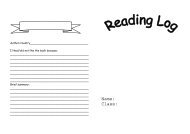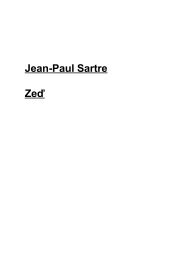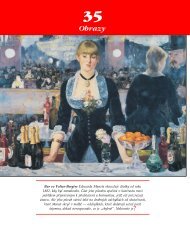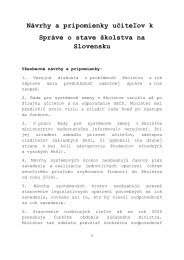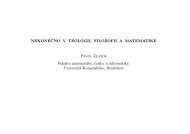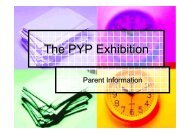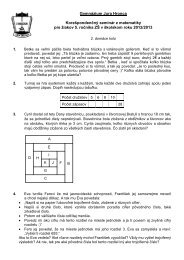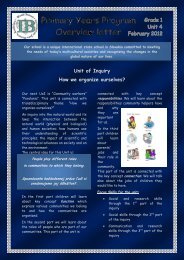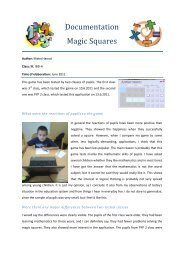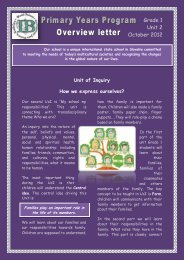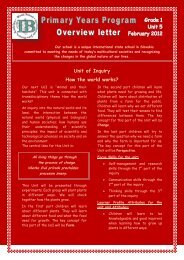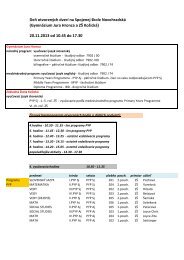How we organize ourselves
How we organize ourselves
How we organize ourselves
- No tags were found...
You also want an ePaper? Increase the reach of your titles
YUMPU automatically turns print PDFs into web optimized ePapers that Google loves.
Lines of the inquiryCentral idea:Transportation systems directly impactthe needs of a community.Qualities of different types oftransport. In the first part of theUoI <strong>we</strong> will learn about differenttransportations. This part of theunit will be divided into threeparts:A. Transportation in the air.B. Transportation on the road.C. Transportation on or underthe sea.The transport has undergonemany changes. In the secondpart of the unit children willlearn why transport is changedover the time. We are going totalk about important facts thatare connected withtransportation (Titanic, rocket onthe Moon…)My journey to school. Childrenwill learn about the maps. <strong>How</strong><strong>we</strong> use maps and how they helpus to go somewhere.Key conceptsFunction – <strong>How</strong> does it work?Children will understand thateverything has a purpose; arole or a way of behaving thatcan be investigated.Question:<strong>How</strong> do different kinds oftransport work?Causation – Why is it like it is?Children will understand thatthings do not just happen, thatthere are causal relationshipsat work, and that actions haveconsequences. Question:What kind of transport <strong>we</strong>might use to travel?Connection – <strong>How</strong> is itconnected to other things?Children will understand that<strong>we</strong> live in the world ofinteracting systems in whichthe actions of any individualelement affect others.Question:Why has transportationchanged?SkillsResearchingskillsCollecting data: Gatheringinformation from a varietyof first- and second-handsources (books, films,people, museum, ITC)Presenting researchfindings: Effectivelycommunicating what hasbeen learned; choosingappropriate media.Thinking skillsDialectical thought:Thinking about two ormore different points ofview at the same time;being able to construct anargument; realizing thatother people can also takeone`s own point of view.CommunicationskillsWriting: Recordinginformation andobservations; taking notesand paraphrasing; writingsummaries; writingreports; keeping a journal.
Home PROJECT„My journey to…“EVIDENCESummative assessmentChildren will draw their journey to (school, grandma, club,…)They need to draw a map, they will show the most importantthings they are passing.ASSESSMENTTeacher will prepare a checklist to assess the presentation.School PROJECT„Transportation“EVIDENCEChildren will be divided in three groups. Each group will preparea model of transportation on the road, see, and air.ASSESSMENTTeacher will prepare a rubric to assess the evidence.PROJECT from English„PYP Transportation journal“EVIDENCEChildren will research the information about the importantfacts that are connected with the transport.ASSESSMENTTeacher will prepare a checklist to assess the journal.Learner ProfilesVocabularyMeans of transportTransportFerryMotorbikeCoachLorryVanPlaneCablewayInquirerPublic transportSeatReturn ticketFareRailway stationPlatformCarriageans<strong>we</strong>rs.CompartmentSeatAirportBus stopHarborTimetablePassengers’DriverPilotTicket inspectorAir stewardessSubmarineTankerTaxiCourageousTramTube trainYachtActivitiesSunbathestrategies.Go hikingGo sightseeingSnorkelingDivingVerbsdriverideflyget onget ofcatchtakechangemisstake offlandhitchhikebe on timebe delayedcheck indeparturearrivaljourneytravelwaytripflightcruiseStudents will be encouraged toformulate questions about theunit and given opportunities toresearch and investigate forKnowledgeableChildren will becomeknowledgeable when theyexplore concepts, ideas andissues about how the vehicleschanged over the time. Theywill try to find out why it isimportant and how it helps us.Children will approachunfamiliar situations and learnthe independence of spirit toexplore new roles, ideas and
LanguagesEnglishVocabularyWritingDuring English <strong>we</strong> will learn how to a newspaper report. Wewill learn that newspaper reports have to grab the reader`sattention. They need punchy headlines and gripping firstfew lines to make sure that you’re read on.Starting to writeChildren will learn that they should write in chronologicalorder.Which tense?We will learn which tense is important to use – past.All in orderBefore <strong>we</strong> start <strong>we</strong> will make a timeline.ReadingChildren will read a book in groups. The book will beconnected with the unit of inquiry. In the end of the unitchildren will write a report from the book.SlovakGrammarWe are focusing on distinguishing marks (rozlisovacieznamienka). We will learn about divisions of letters.WritingChildren will continue with the cursive writing. They willfinish the first notebook (pisanie) and start with the second.We will have a practice test from the first notebook.ReadingChildren will practice their reading form Citanka or fromother books <strong>we</strong> have in the library.We will focus on correct reading of commas, dots, questionmarks,….Means of transportTransportFerryMotorbikeCoachLorryVanPlaneCablewayPublic transportSeatReturn ticketFareRailway stationPlatformCarriageCompartmentSeatAirportBus stopHarborTimetablePassengers’DriverPilotTicket inspectorAir stewardessSubmarineTankerTaxiTramTube trainYachtActivitiesSunbatheGo hikingGo sightseeingSnorkelingDivingVerbsdriverideflyget onget ofcatchtakechangemisstake offlandhitchhikebe on timebe delayedcheck indeparturearrivaljourneytravelwaytripflightcruise
MathematicsReview from previous unitData and graphs‣ Taking a survey is one way to collect information,or data.‣ You can collect and show data using a Venndiagram.‣ A pictograph helps you compare information‣ A line plot shows how many times has somethinghappened.‣ Coordinate graph can tell you what is wherelocated.TimeWe will learn how to tell time to five minutes.New Maths Words‣ Midnight – 12 o`clock at night, the middle of thenight.‣ Noon – 12 o`clock in the daytime, the middle ofthe day.‣ Quarter past, half past, after, before, quarter to‣ From midnight until noon is A.M.‣ From noon until midnight is P.M.Measurement (km, cm, m, mm)We will learn about ways to measure length, <strong>we</strong>ight, andhow much something holds. We will learn how to predicthow likely or unlikely it is that certain things will happen.New Math Words:‣ Centimeter, meter, kilometer,‣ Inch, foot, yard‣ Reading maps
ReflectionDear parents,The choices people make can affect theirhealth and <strong>we</strong>ll-being.Fruit landWe finished the first unit of inquiry. Children where reviewingfrom last year – the rules and healthy lifestyle. Unit was dividedin three parts:<strong>How</strong> to stay safe – We <strong>we</strong>re talking about the rules <strong>we</strong> have inthe class or when <strong>we</strong> go somewhere else. We decided on rules<strong>we</strong> are going to respect during the whole school year.Super massageEach child has at the begging of the <strong>we</strong>ek 5 monsters. They canget a new monster, but they can also lose a monster. Theassessment chart will be used by all of the teachers in the class.My lifestyle and its effect on my health – We made in the class ahealthy chart, where children <strong>we</strong>re making points. Childrencould make 5 points per day – brushing teeth, healthy food,drinking water, exercise, wash hands.FBI ExerciseIn this part children <strong>we</strong>re preparing their Home Project – Myhealthy <strong>we</strong>ek. Children brought to school a great project withlots of different ideas.Different sources help us make choices correctly – during thispart of the unit children <strong>we</strong>re researching the information fromtheir school project. Children <strong>we</strong>re working in five groups. They<strong>we</strong>re preparing all the stuff they will need for the project.Children enjoyed the <strong>we</strong>llness project a lot. They <strong>we</strong>re workingin the class a lot to prepare the excellent day <strong>we</strong> had. They <strong>we</strong>rebringing a lot of new information from home. They brought thestuff they needed. Children made a good job during the day ofour school project. All the classes enjoyed the <strong>we</strong>llness in ourclass.I’m really looking forward to discovering what children can doduring our new unit of inquiry.Special masksRelaxing timeBest regards,Ms. Katarina Patucova



